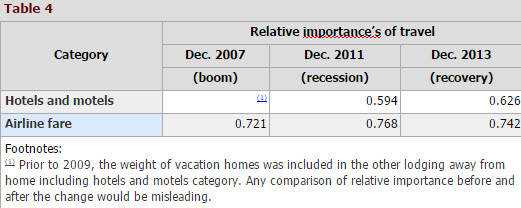By Eric Richman
Since we’re currently living in a period of economic recovery, it would be wise to reflect on the recent economic recession. Consumers tend to become more frugal with their dollars during periods of recession, so it is interesting to see what they will and will not spend their money on. Some purchasing trends are more intuitive than others: for example, we’d expect people to eat at home more often than out at restaurants. An intuitive trend from the Great Recession that is represented in the table below is consumer vehicle purchasing before, during and after the recession. There is clearly a sharp decline in new vehicle purchases and a modest rise in used vehicle purchases.

This is expected during hard economic times, as people cannot afford to buy a brand new vehicle and must settle for older more affordable vehicles. Along with decreasing new vehicle purchases, another expected trend is decreasing amount of homeownerships and an increase in renting. According to April’s 2009 trendswatching report, the recession created a consumer which the report dubbed ‘Sellsumers’. These consumers have become particularly creative in finding ways to sell extra space or services, for instance renting homes or parking, reselling unwanted items, and many more creative ways.
A trend that is not as intuitive as increased renting opportunities is what happened to airline fare. One would expect travel to decline resulting in decreasing airfare purchases, yet this was not the case. The table below shows that the index for airline fair rose highest during the recession and now has decreased during the recovery. This is counterintuitive as the table also shows the importance of hotels and motel rising from the recession to the recovery, which should result in airline fare rising as well. This could be a result of people in the recovery period looking for less expensive ways to travel, in order to save money to travel more. Whatever the reason is the airfare industry did not see a decline like many other industries did.

A second less intuitive trend during the Great Recession was an increase in matchmaking services. According to a February 2009 article in the New York Times, “Online and offline matchmakers are reporting that dating interest is up, way up.” The article goes on to state that Match.com had one of its strongest quarters in the past seven years. It even states brick-and-mortar matchmaking services in cities like New York, Los Angeles, and Miami were up 40% among women in early 2009. There are a variety of possible reasons for this increase in matchmaking services, yet the most sensible is that with more people facing hard financial times they would rather have someone to be with than face it alone. More people are staying home to save and online looking for someone to meet.

As well as matchmaking services, another less intuitive industry that typically will see an increase in business is the sin industries. People will buy a bottle of wine or a pack of cigarettes to help cope with the malaise that generally comes to consumers during a recession. One of the services in the sin industry that does not do as well as some of its counterparts is gambling. Usually the products and services in the sin industry that give small pleasures and are less expensive can be found to do well. Gambling on the other hand is found to be a luxury not many will dare to afford during a recession. On the contrary, gambling usually does its best whenever the economy is booming. Since people lean towards staying home when money becomes tight, they also lean towards finding low-cost entertainment to keep them busy while at home. Many turned to online gaming that is at sometimes free and is easily accessible to millions of users at a time. People now given more leisure time will also arrange to watch their favorite TV shows and movies, increasing the use of sites like Hulu and Netflix. It will be rather interesting to see whether some of these services can maintain their recession time numbers and which ones will falter during the economic recovery. With people gaining lost purchasing power it will be fascinating to see if they will be more cautious in their spending now during the recovery, since they have seen how hard times can get. Sourceshttp://www.nytimes.com/2009/02/12/fashion/12dating.html?_r=0http://memesponge.com/2009/06/top-10-emerging-consumer-behavior-trends-in-recession/http://www.investopedia.com/articles/stocks/08/industries-thrive-on-recession.asp


